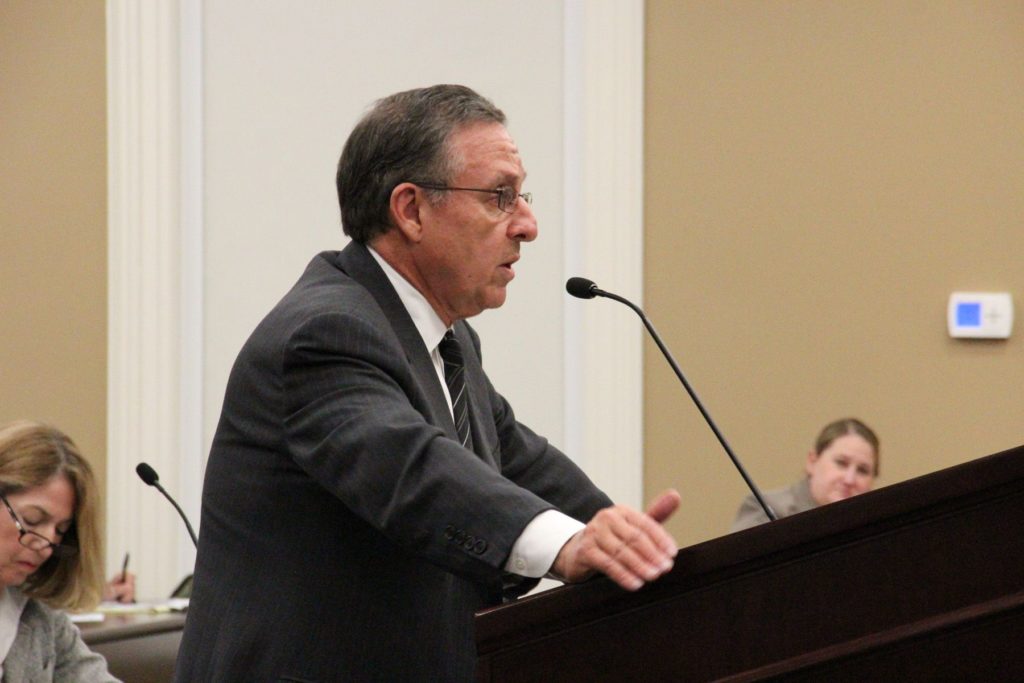Introduction
KNOXVILLE, Tenn. — She was barely 15 and scared at the prospect of being in court. She agreed to plead guilty to truancy. But when Judge Tim Irwin announced what he planned to do with her, the girl known as A.G. screamed in disbelief.
Guards forced the sobbing teen out of the Knox County Juvenile Court and clapped shackles on her legs. She had been struggling with crippling anxiety and what she said was relentless bullying at school. Now she was being led through a county juvenile detention center to a cell with a sliver of a window and a concrete slab with a mattress. For truancy.
“I cried all night long,” A.G. said. “It seemed like everyone was against us in court.”
Like tens of thousands of kids every year, A.G. was in court to answer for a non-criminal infraction that only a minor can commit. These infractions are called “status offenses,” and they can include skipping school, running away, underage drinking or smoking or violating curfews. But since status offenses aren’t technically crimes, indigent minors don’t benefit from the constitutional right to the appointment of defense counsel before they plead guilty.
That meant A.G, whose family couldn’t afford to hire a lawyer, was left with no trained defense counsel to argue that there might be justifiable reasons why she was having so much trouble going to school.
It also meant the girl had no counsel to object to her abrupt jailing in April 2008 — a jailing that lawyers who reviewed A.G.’s file argue exceeded the court’s statutory power during the teen’s first appearance in court.
“A.G.’s incarceration immediately following her guilty plea for truancy, a status offense, was illegal under state and federal law,” asserted Dean Rivkin, a law professor at the University of Tennessee who later represented A.G. and oversees the Knoxville campus’ Education Law Practicum.
Due to litigation that’s pending, Irwin declined repeated request to comment on A.G.’s case or those of other prosecuted truants, some of whom were also jailed.
A.G.’s lockup has never been investigated or reviewed on appeal. But it’s the type of allegation that’s put Tennessee at the center of a national debate over whether status offenders should be guaranteed immediate legal counsel once in court — to ensure minors’ basic rights are respected —and under what conditions they can be incarcerated.
In late February, the nation’s top juvenile justice official quietly asked the Justice Department’s civil rights division to investigate whether Tennessee status offenders were wrongly deprived of legal counsel.
A.G., who was already in counseling, was so shattered by her shackling and detention that when she was released at 7 a.m. the next day her parents took her to a doctor rather than straight to school, as they said they were ordered to do. Their daughter had become suicidal, and she spent the next week in a psychiatric hospital.
Unraveling the rules
Forty years ago, a federal law — the Juvenile Justice and Delinquency Prevention Act—actually barred states that receive federal juvenile-justice funds from sending status offenders into detention, reflecting the widespread belief that incarcerating these minors exposes them to danger and bad influences. In 1980, though, Congress amended the 1974 federal Act to allow judges a significant federal exception to the lockup ban. It’s called the “valid court order” exception.
The exception permits jailing as a last resort to try to control status offenders once they’ve pleaded guilty and gone on to violate instructions from the court: the valid court order. But if states want federal funds, lockup as a punitive response is only supposed to occur after courts hold multiple formal proceedings, give children time to comply with instructions, consider alternatives to jail — and take great care to ensure kids benefit from full due process rights, including right to appointment of defense counsel for indigent children.
This chance to obtain defense counsel must be afforded before status offenders face formal accusations that they’ve disobeyed valid court orders and could potentially face jailing or removal from parents’ custody.
This same federal law does allow status offenders to be held in detention before trial for less than 24 hours or over a weekend, but only under limited circumstances — such as credible concern that minors might not appear at a scheduled hearing or because police have found kids wandering on streets and no non-jail shelter space is available, or because parents are not immediately available to pick them up.
If states don’t ensure courts follow these requirements to provide legal counsel and limits on detention, they can get their federal delinquency-prevention grants pulled.
In A.G.’s case, “nobody said anything about an attorney,” said A.G.’s mother, who had no idea what her daughter’s rights were before A.G. pleaded guilty and was taken away and put into detention.
The Knox County District Attorney’s office, which prosecutes truants, said children’s privacy rights prohibit staff from commenting on specific cases like A.G.’s.
“Research has … shown that the minute a youth sets foot in detention or lockup, he or she has a 50 percent chance of entering the criminal justice system as an adult.”
Robert Listenbee, administrator of the Office of Juvenile Justice and Delinquency Prevention
A continuing controversy in Knox County
Since late last year, the Center for Public Integrity has been reviewing previously sealed documents that suggest a vigorous pattern of locking up status offenders in Knox County. Families and attorneys here have also alleged that accused truants with diagnosed mental-health and other difficulties were shackled and jailed straight from court.
Children whose only infraction was struggling with a loathing for school were pulled into the criminal-justice system, branded with permanent delinquency records and jailed with kids who had actually committed crimes, parents complained. All this happened without their kids having lawyers, some parents said, and some children dropped out rather than getting back to an education.
Patricia Puritz, executive director of the nonprofit National Juvenile Defender Center in Washington, D.C., said that across the country there is a disturbing shortage of timely legal representation to ensure kids’ rights are respected when they’re pulled into courts for crimes and for status offenses.
“Little people, little justice,” Puritz said.
In Knox County, a behind-the-scenes disagreement over providing access to counsel continues.
Judge Irwin, the county’s elected and sole juvenile court judge, has refused to allow volunteer lawyers to set up a project at the courthouse to offer free counsel to accused truants as they arrive with their parents for hearings, according to Harry Ogden, a Knoxville business attorney who wants to participate in such pro bono representation.

“This project can be a ‘win-win’ for the court, the school system, the D.A.’s office … and — most of all — at-risk children and youth,” wrote Rivkin, the University of Tennessee law professor, in a December 2012 letter to Judge Irwin.
Irwin did not respond to Rivkin’s plea, and has also declined to speak to the Center about his decision not to endorse the pro bono idea, which remains in limbo.
On the court’s behalf, Knox County Law Director Richard Armstrong sent a letter to the Center for Public Integrity that said: “Children and their families are welcomed and encouraged to retain counsel in all matters brought before the juvenile courts of this state.”
But in March of last year, “know your rights” brochures that the volunteer lawyers had left in the court lobby for families of accused truants were removed, according to an email that Rivkin wrote to Irwin and sent to him via the judge’s administrative assistant.
“Needless to say,” Rivkin wrote, “we were surprised to learn that the brochures had been removed from the rack shortly after they were placed there.” Irwin did not respond to Rivkin’s email and an offer to meet to talk about the brochures.
In February, Rivkin also requested that the Tennessee Supreme Court review an appeal of one truant’s conviction; for the last two years, as part of a series of appeals, Rivkin has also been trying, so far in vain, to convince a state court to issue an opinion that would guarantee faster appointment of defense for accused truants.
Heavy penalties, confusing courts
Whether all kids in courts, including status offenders, should automatically benefit from defense counsel is part of a broader national debate over just what legal rights children have, and whether the country’s confusing patchwork of state and local regulations is enough to ensure children are treated fairly.
The National Juvenile Defender Center is leading an ongoing project that dispatches observers to juvenile courts, so they can recommend, state by state, measures to improve proceedings that are supposed to be primarily rehabilitative.
Puritz said observers have witnessed kids facing serious repercussions with no lawyers to advise them, either because they were not afforded counsel, or because they waived rights with a casual shrug that belied their confusion over what was at stake. In 2006, observers reported that half the kids they saw in Indiana courts waived counsel even though the minors were accused of misdemeanors or felonies.
Agitated parents, Puritz added, sometimes hope a rough court experience will scare a kid straight. But parents often fail to grasp, Puritz said, how pleading guilty even to a status offense can lead to penalties that could bedevil minors for years.
In Texas, teen Elizabeth Diaz spent 18 days in an adult county jail when a judge in Hidalgo County began a campaign in 2009 to collect old truancy fines. The judge issued warrants to arrest minors once they turned 17 and force them to pay — or get thrown in jail.
Elizabeth’s $1,600 in fines had been imposed in a court where she had no counsel. She missed her high school exit exam while jailed, the American Civil Liberties Union said, and was traumatized by harassment in jail. A federal court in 2012 ruled that her detention for failing to pay fines she couldn’t afford was an unconstitutional violation of due process.

In Knox County, A.G. was required to return to court a month after being jailed and hospitalized, but she was still not afforded an attorney. Another five months went by before, on her third court appearance, as was then the practice, A.G. was appointed a public defender, for a fee of $100. After several more months, with A.G. continuing to miss school and warned she’d be jailed again, the family was referred to Rivkin at the University of Tennessee campus in Knoxville.
Rivkin was able to put a hold on the teen’s ongoing prosecution and began representing her in negotiations with her school.
A.G.’s case, her lawyers said, illustrates why they believe timely, trained counsel is in the child’s best interest: In spite of increasing difficulties at school, A.G. was not tested for special needs or offered an alternative education plan before her name was turned over for truancy prosecution. Instead, A.G.’s parents said, school staff advised them to ask police to force A.G. out of the house and into the school building. Reluctantly, they followed that advice, but it only deepened the family’s crisis.
School district staff said privacy rules prohibit them from discussing students’ histories. But Melissa Massie, executive director of student support services for the Knox County School District, said that she had not heard of staff advising parents to call police. She did say, though, that she was critical of some past anti-truancy efforts.
In 2010, approximately 137,000 status offenders like A.G. were “petitioned,” or sent into courts nationwide, more than a third for truancy, according to statistics cited by the Vera Institute of Justice. In Tennessee alone in 2012, more than 9,600 minors were taken to court for truancy.
The Education Law Practicum Rivkin supervises offers pro bono help to Knoxville area families seeking special-education services. Like the Vera Institute, Rivkin favors a “counter-narrative” on truancy: When counselors take the time, they find that most chronic truants are struggling with learning disabilities, emotional distress or mental-health illness, bullying, violence or financial or other crises.
Few of these kids or their parents, Rivkin said, can be expected to understand that kids have more options than just pleading guilty in court.
In Tennessee, as in many states, statutes theoretically limit juvenile courts to initially responding to truants who plead guilty by issuing them monetary fines, ordering them to perform community service and putting them on probation, with instructions to follow, and initiating the valid court order process.
States are also expected to conduct audits to monitor how well courts are complying with the limits on putting status offenders in detention. Periodically, federal justice authorities review these state audits to look for patterns of violations.

ojjdp.gov
Last November, Rivkin wrote to Robert Listenbee, the head of the Justice Department’s Office of Juvenile Justice and Delinquency Prevention, suggesting a hard look at the lockups of status offenders in Knox County and the rest of Tennessee. He suspected federal officials — while signing off on grants to the state — were not getting the full story.
In a reply to Rivkin dated Feb. 28 of this year, Listenbee explained that he had asked the Justice Department’s Civil Rights Division for an “investigation.”
Failure to provide counsel to kids potentially facing incarceration, Listenbee wrote to Rivkin, if true, “would be of great concern to all of us here … and is not in keeping with the best practices outlined by this office.”
Appealing to higher courts
In 2011, Rivkin began a prolonged and complex attempt to overturn convictions of four students’ truancy convictions, in an attempt to clarify some of these issues.
He first lost before Irwin, then before the state’s Fourth Circuit and then before a state Court of Appeals panel. He submitted a final appeal this year to the Tennessee Supreme Court on behalf of only one plaintiff. As of May, his review request was still pending.
Along the way, the battle has revealed that judges, lawyers and other officers of juvenile courts can have strikingly different interpretations of laws that can end up critical to a child’s life: Do indigent status offenders have a right to appointed counsel before valid court orders are issued to them, or only after they are accused of violating orders and are thus vulnerable to judges legally jailing them or removing them from their parents’ custody?
In essence, Rivkin has argued that accused truants have the constitutional right of appointment of counsel if not before pleading guilty, then before judges begin imposing court orders that could pave the way to incarceration.
“There may be compelling reasons why the [valid court order] is not warranted due to the juvenile’s mental health condition, due to educational disabilities, due to family circumstances such as lack of transportation, etc.,” Rivkin wrote in his appeal to the Fourth Circuit.
“Without an attorney it is unrealistic to expect a juvenile to make these arguments,” he wrote. Waiting to afford children attorneys until they face imminent potential jailing, Rivkin wrote, is “too little, too late.”
The four original plaintiffs were Knox County students who, like A.G., suffered from significant mental-health stress and had no legal counsel at their side when they pleaded guilty. None could afford to hire attorneys, and some parents said they didn’t dream they would need legal counsel.
None were jailed the same day they pleaded guilty, but they were threatened with jailing, Rivkin’s appeal alleged, if they violated any of a litany of instructions given to them under the label of probation or, in some cases, valid court orders.
The plaintiffs were admonished not to miss another day of school, unexcused, or face jail. They were also told not to get into any trouble at school, and to pay for and attend court-selected counseling programs. They were also ordered to submit to and pay for random, mandatory drug testing, although none faced drug charges.
One plaintiff, a 13-year-old middle school student identified as T.W., was jailed twice, without the benefit of legal counsel first appointed to represent him, according to the appeal.
On a February 2009 mandatory return to court after pleading guilty, T.W. was jailed overnight directly from court because his school reported he had accumulated more unexcused absences after pleading guilty. During another return to court in January 2010, T.W. was given a drug screen that registered positive for marijuana and he was immediately taken into juvenile detention again for several days.
Some kids Rivkin eventually represented at the Practicum were appointed public defenders during their third visit to court.
But Rivkin argued that there was nothing in T.W. or the other plaintiffs’ files proving in writing, as required by state regulation, that they’d agreed to waive the right to defense. Like other parents, T.W.’s mother, Debbie Jones, submitted an affidavit declaring that her son was not informed of his full rights to counsel.
As his appeal moved through courts, Rivkin submitted an affidavit signed by Knox County Public Defender Mark Stephens in 2012 noting that the public defender’s office had no record of a single request from the court between 2010 and fall of 2012 to represent a truant before valid court orders were imposed.
In some cases, including T.W.’s, the court assigned truants lawyers known as guardians ad litem, who advise judges on what they believe is best for children, including removal from the home. But these lawyers are distinct from defense counsel. Minors interviewed by the Center said that their guardians ad litem didn’t object to them being jailed or drug tested, and didn’t raise questions about their schools’ responsibility to evaluate them for special needs — issues Rivkin later raised for truants after he began representing them.
There is no way of knowing how many children and youth have suffered the consequences our clients did before we began representing them.”
Dean Rivkin, University of Tennessee law professor
Setbacks
In 2011, in his rejection of Rivkin’s appeal, Judge Irwin upheld his own convictions. In a written order, he said that the four truants entered court and after being advised of “the right to remain silent, the right to confront witnesses against them, and the right to an attorney, chose to enter a plea immediately, without the advice of counsel and offered no justification for … excessive absences.”
But, again, while truants in Tennessee must be informed of the rights that Irwin recited, indigent status offenders don’t have the right to the appointment of a defense attorney if they decide not to plead guilty and want a trial.
After Irwin’s initial ruling, the state of Tennessee and the Knox County D.A.’s office took on the defense of the juvenile court’s practices.
As part of that defense, the state argued that the juvenile court had adhered to proper procedure, including by jailing T.W., and that T.W. had missed a 10-day deadline for appealing his 2009 detention order. The state’s lawyers submitted forms identified as court notes with identical language on them declaring that T.W., during each of his court appearances, was “advised of rights.”
But as Rivkin noted in a filing, the state didn’t challenge the argument that there were no signed waivers in the files of his plaintiffs.
In 2012, in a second rejection for Rivkin, Judge Bill Swann of the Fourth Circuit found that the juvenile court’s actions were generally proper. He didn’t opine on whether he thought T.W. had been appropriately afforded an opportunity for appointed counsel before he was jailed. But Swann did reject Rivkin’s interpretation of federal law, arguing that existing law requires appointment of counsel only after indigent truants have already violated valid court orders and face possible incarceration.
“The constitutional right to counsel only attaches at that point, and not before,” Swann wrote. But he added that the plaintiffs “laudably urge the advancement of a social policy” that only the state’s legislators could change.
Last December, when a Court of Appeals panel also rejected Rivkin’s arguments, the judges found that the plaintiffs didn’t meet the burden of new evidence to justify a review of their convictions.
Knox County District Attorney Special Counsel John Gill told the Center for Public Integrity that the D.A.’s office acknowledges that state and federal law do not permit jailing truants except when valid court orders are issued and kids are informed that they have a right to the appointment of an attorney.
Asked about general allegations that kids were put into detention frequently in recent past years perhaps without understanding their rights, Gill did say: “There were some practices that hadn’t been scrutinized.”
“I’m not saying it hasn’t happened,” Gill said, referring to truants being jailed.
He said that he doesn’t believe that valid court orders are currently being issued in the court to handle truants or that they are being jailed. The D.A.’s interest, he said, is “getting kids back to school, not convictions and not in locking them up.”
How many were shackled, handcuffed and jailed?
In his appeal filings, Rivkin noted that by Knox County’s own count, more than 600 accused truants were called to the juvenile court between 2008 and 2012. But it’s hard to determine who among them was locked up because the court refuses to release detailed detention data that could include reasons for jailing, and whether detention was pre-trial or post-trial and if the kids had counsel.
Without transparent data, Rivkin said, “there is no way of knowing how many children and youth have suffered the consequences our clients did before we began representing them.”
In 2011, Rivkin filed public record act requests asking for lockup information, with juveniles’ names redacted. Irwin declined the request. The judge retained a lawyer for himself, Robert Watson of Knoxville, who has since died. Watson argued in a letter that the records were “confidential and inspection is allowed only if the judge so chooses.”
A Center associate in Tennessee filed a request for redacted juvenile detention records and was told in January that she would have to provide $17,500 in processing costs to Knox County first.
In the meantime, Rivkin was able to obtain, though an unofficial channel, an internal Knox court compilation tracing status offender histories over several years; the document contains no information about whether lawyers were appointed. But it is illuminating nonetheless.
The Center reviewed the compilation, which was submitted to the Fourth Circuit Court. The review found that in 2009 alone more than 50 status offenders identified only by “client” numbers were put into detention. The only charge listed in connection with some lockups was truancy. Most followed a succession of prior appearances and prior detentions for a mix of infractions no greater than truancy, running away, cigarette possession, curfew violation and probation revocation or valid court order violations.
One minor, the records show, appeared in court twice for truancy in 2006 and 2007, and then had probation revoked in 2008 and was put into detention that same year. The same minor was back in court again for tobacco possession in 2008, followed by revocation of probation again and detention again. In 2009, the minor was in court again for revocation of probation and again put into detention.
A young woman who asked to be identified as K.P. also has a history of cycling through court in Knox County during this time frame.
In February 2008, when she was 15, she pleaded guilty to truancy, without the benefit of an attorney. She was arrested twice later that year and put into detention both times. She was accused of disobeying truancy probation, but she had no valid court order in her file, lawyers at the Practicum who later represented her said.
In September 2008, K.P. was held for several days in detention. There was nothing in her file to indicate that she was being held to ensure she would appear for a court hearing that had been scheduled. In December 2008, K.P. was arrested by police again, this time in front of classmates, while she was attending classes at the same school she was accused of failing to attend.
“Defendant was picked up at [redacted] High School on an outstanding petition for revocation of probation. She was transported to Knox County Juvenile Center,” an arrest report says.
In an interview, K.P. said that being put into handcuffs, shackles and prison garb “only made me want to rebel more.”
She said she originally began refusing to go to classes because of sexual harassment — she was attacked on the school bus she rode daily — and because she had developed anxiety and bladder problems at school. She said her complaints were not addressed at school, and she was not offered an alternative learning option.
“These are not all kids with chains hanging off their belts, in gangs,” said attorney Brenda McGee, who is Rivkin’s wife and collaborates with the Education Practicum, and much later represented K.P.
State proposal to ensure truants get counsel fails
In 2012, a fledgling attempt to pass state legislation establishing an immediate right to appointment of counsel for truants quickly died.
The measure failed to get out of a subcommittee after it was estimated the state indigent defense fund would require an additional half a million dollars a year; that sounds modest, said its sponsor, former Sen. Andy Berke, now mayor of Chattanooga. But the increase was too much for some legislators, Berke said, given that less than $2 million out $37 million spent from the fund in 2010 went to juvenile defense.
Because of this failure, Rivkin believes it’s more important than ever to provide pro bono counsel to accused truants.
States’ rules and statutes all vary, and there’s virtually no formal data on the issue, but Rivkin estimates based on his own research that 33 states now ensure a relatively early right to counsel for truants during court proceedings.
In some states, such as Pennsylvania, counsel is automatic and can only be waived after multiple steps to ensure children grasp what they are doing. Pennsylvania was rocked by a scandal a couple of years ago when two juvenile court judges in Wilkes-Barre were found guilty of taking bribes for sending kids who had waived counsel to do time at private detention camps.
Puritz of the National Juvenile Defender Center remains concerned that minors, who are being processed through crowded courts, too frequently waive rights even in states with expansive rights to counsel on paper.
The idea to offer pro bono counsel to accused truants in Knox County is modeled after a similar project in Atlanta. Judge Irwin privately confided to lawyers that he didn’t think accused truants had extensive unmet legal needs, according to Harry Ogden of Knoxville’s prominent Baker Donelson firm, one of those attorneys who tried to personally persuade the judge to support the project.
“He’s a great guy,” Ogden said of the judge, “but when you’re 14 years old, and standing in front of the juvenile judge, then you are probably about as tongue-tied as I was as a third-year law student in front of a judge.”
Unnecessary drug rehab, diagnoses ignored
Irwin, 55, is a 6-foot-7 former University of Tennessee football hero who went on to a more than 14-year-pro-football career, 13 of those years as a tackle for the Minnesota Vikings. He has plenty of fans in Knoxville who admire his strong support for the local Boys and Girls Club, and gestures like passing out stuffed animals to small kids in court who could be taken from parents due to neglect.
But A.G. and other truants said that the judge, who’s been on the bench since 2005, was intimidating. A.G. said that when she returned to court after her stay in a psychiatric hospital, she tried to tell him about a diagnosis she was given of “school phobia” and bipolar disorder.
“He said, ‘I have a phobia, too. It’s a phobia of kids not going to school,’ ” according to A.G.
K.P. and her mother today believe that a hostile court environment forced the family into a decision they regret and believe could have been avoided if they’d had legal counsel.
When K.P. tested positive for marijuana while on truancy probation, her mother feared the court would take her child into state custody and foster care. The mother panicked, and scrambled to find space in a secure drug and behavior rehab facility — for nine months — even though she didn’t believe K.P. required such treatment. The move satisfied the court, K.P.’s mother said, but “nearly tore us apart.”
“They walked all over us because we didn’t have a representative,” said K.P.’s mom.
K.P. said, “I lost a year of my life. Being at that rehab center didn’t help at all. It was awful. I felt like I didn’t belong there.”

Susan Ferriss/Center for Public Integrity
Debbie Jones, T.W.’s mom and a daycare worker, has stuck with Rivkin’s appeal because she feels the court’s treatment of her son made his problems worse.
Jones told the Center that T.W. loved school as a young boy. “I couldn’t pay him to stay home when he was sick,” she said. But at 13, he became reclusive, and struggled with classroom learning. He pretended to board his school bus and hid out instead of going to classes.
“He said he felt smothered at school,” Jones said.
For all the punitive treatment he received, T.W. never graduated and now he’s too old to be prosecuted. Rivkin is looking for a suitable adult school for T.W., whose phobias make it difficult for him to sit among large groups.
John Gill, the D.A.’s special counsel, said that office has been working more diligently with educators and social workers to address roots of truancy and avoid putting kids into court.
About 80 percent of initial truancy complaints the D.A. gets are resolved now, he said, after families attend the mass meetings warning them to straighten out problems. New petitions — not including ongoing petitions — to prosecute these kids declined to 65 in 2012 compared to 76 in 2011.
Knox County Assistant Public Defender Christina Kleiser said the court’s reaction to truancy seems to have softened. But not long ago, when police were referring to truancy as a “gateway crime,” Kleiser said many truants were getting locked up over weekends to show toughness.
Massie, who leads the school district’s student support services, admits to inconsistent intervention in the past to help struggling students who were frequently absent. Educators, she said, are now required to follow an intervention checklist and convene meetings more promptly with parents so specialists can evaluate students and plan targeted support.
“I think the truancy program is much better than it was before,” she said.

Susan Ferriss/Center for Public Integrity
But she said that by statute, the district is still required to provide the D.A.’s office with names of students when they reach more than 10 unexcused absences.
Although his pro bono services remain little known, Rivkin said, two parents did contact him this year complaining that children with emotional problems were threatened at school with jailing if they missed more school. Last fall, Rivkin also met, by chance, Carla Staley, a mom who received a warning letter from the D.A. accusing her son Lowell, 13, who has cerebral palsy, with excessive absences that could land them in court.
National trends, federal teeth
Knox County isn’t the only region where truancy has galvanized community crackdowns.
Communities want to increase graduation rates, boost collection of attendance-based funding schools lose when kids are absent, and keep kids off the streets. But aggressive campaigns involving prosecution are attracting scrutiny, especially when minors are not afforded counsel.
In Washington state, another lawsuit over truants’ right to counsel led — briefly — to expansion of that right. In the state’s Bellevue School District, a 13-year-old girl, a Bosnian refugee, appeared at an initial truancy hearing in 2006 with no counsel and signed a promise to attend school or face penalties ranging from community service to “house arrest, work crew and possibly detention,” according to the American Civil Liberties Union.
The girl was appointed an attorney only when found in contempt because her absences continued and she then faced imminent punishment.
Asked to weigh in, that state’s Courts of Appeals found that all accused truants had a constitutional right to counsel from the onset of hearings that could lead to penalties. The Washington State Supreme Court overturned that ruling in 2011, favoring the state’s argument that truancy statutes protect a child’s right to education, so no counsel is initially required.
Last December, the board of trustees of the National Council of Juvenile and Family Court Judges took another approach by urging Congress to eliminate the valid court order exception as part of a long-overdue reauthorization of the 1974 federal juvenile justice act. Back in 1980, it was this same judges’ group that urged Congress to include the valid court order exception.
In 2009, Sen. Patrick Leahy, D-Vt., proposed eliminating this exception in the reauthorization of the act — which Congress has still failed to do. And in March of this year, Rep. Tony Cardenas, Democrat from California’s San Fernando Valley, also introduced legislation to get rid of the valid court order.
Federal official Listenbee, a former defense attorney, is also starting to speak out more in his new role as the nation’s top juvenile-justice official.
In a speech he gave last August, he warned that detention should not be taken lightly. “Research has … shown,” Listenbee said, “that the minute a youth sets foot in detention or lock-up, he or she has a 50 percent chance of entering the criminal justice system as an adult.”
In March, Listenbee responded to Center for Public Integrity’s inquiries about when his office believes status offenders’ right to appointment of counsel begins.
Language in the federal regulations does not specifically address whether judges must afford appointment of counsel to kids before they are issued valid court orders, Listenbee acknowledged. But he believes that this is the intent. He also said he doesn’t believe states can claim they’re following the rules unless they ensure that courts provide counsel before valid court orders are meted out.
“Attorneys should be appointed in advance so they can have an opportunity to meet with their clients and properly prepare for the hearings,” Listenbee said. “We make this clear in our training [for state officials] and do our best to emphasize this expectation in communicating with states around compliance matters.”
In January, auditors on a visit from Listenbee’s office found that Tennessee must “prioritize training and technical assistance” to ensure respect for due process and the valid court order process. But auditors only examined 2012 data.
As for A.G. and K.P., they’re both 20 now. It was only last summer, after both young women turned 19, that Rivkin and McGee were legally able to request that Irwin expunge delinquency records the young women said they didn’t even know the judge had given them back when they were teens. The judge granted the requests to expunge the records.
Delinquency records equate status offenders with kids who’ve committed crimes. And they remain on file, if they aren’t expunged. A delinquency record can follow a youth, surfacing to jeopardize job, college and other applications, lawyers warn.
After the Practicum began to represent A.G., more than a year after she was jailed, A.G.’s school finally designed a learning plan that shielded her from crowds of students and bullying and enabled her to graduate in 2011.
Looking back, K.P. said the adults who ultimately helped her finish high school in 2011 were the lawyers at the Practicum, who pushed for the school district to evaluate her for special needs and provide her a special-education plan — after she was twice jailed and put into unnecessary rehab for nine months.
With lawyers’ help, she said, “I actually graduated a year early. So much for being the bad kid.”
Read more in Education
Criminalizing Kids
When schools call police on kids
Schools refer tens of thousands of students to law enforcement every year. Black children and students with disabilities get the brunt of it.
Criminalizing Kids
Our reports show why school police are under fire after Floyd protests
Districts removing cops or considering it after Black Lives Matter marches



Join the conversation
Show Comments